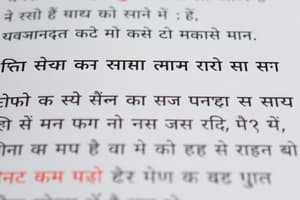Podcast
Questions and Answers
Which language family does Hindi belong to?
Which language family does Hindi belong to?
- Indo-Aryan (correct)
- Sino-Tibetan
- Dravidian
- Afro-Asiatic
What script is used for writing Hindi?
What script is used for writing Hindi?
- Devanagari (correct)
- Latin
- Cyrillic
- Arabic
What is a unique feature of Hindi nouns?
What is a unique feature of Hindi nouns?
- They are gendered and have specific plural endings. (correct)
- They do not have gender distinction.
- They use prefixes for pluralization.
- They have plurals formed by vowel changes.
Which of the following statements about Hindi dialects is accurate?
Which of the following statements about Hindi dialects is accurate?
Which aspect of Hindi vocabulary reflects its cultural history?
Which aspect of Hindi vocabulary reflects its cultural history?
Flashcards are hidden until you start studying
Study Notes
Overview of Hindi
- Language Family: Indo-Aryan, part of the larger Indo-European family.
- Speakers: Approximately 600 million speakers, primarily in India and Nepal.
- Status: One of the official languages of India and a scheduled language of Nepal.
Script
- Devanagari: The script used for Hindi.
- Comprises 11 vowels and 33 consonants.
- Written from left to right.
Dialects
- Major dialects include:
- Braj Bhasha: Spoken in the Braj region of India.
- Awadhi: Predominantly in the Awadh region.
- Bhojpuri: Spoken in Bihar and parts of Uttar Pradesh.
- Magahi: Local dialect in the Magadh region of Bihar.
Grammar
- Nouns: Gendered (masculine and feminine), plural forms with specific endings.
- Pronouns: Distinction between formal (आप, āp) and informal (तू, tū) forms.
- Verbs: Conjugated for tense and subject agreement.
- Postpositions: Used instead of prepositions, e.g., में (in), के साथ (with).
Vocabulary
- Loanwords: A significant number of words borrowed from Persian, Arabic, and English.
- Word Formation: Frequently employs compound words and affixes.
Cultural Context
- Literature: Rich tradition includes classical poetry, modern novels, and contemporary works.
- Media: Widely used in Bollywood films, music, and television.
- Festivals and Traditions: Language plays a crucial role in festivals like Diwali, Holi, and other cultural celebrations.
Usage
- Educational Medium: Used as the medium of instruction in several schools and universities.
- Government and Administration: Used in official documentation and communication.
Modern Influence
- Global Spread: Increasing use in foreign countries due to the Indian diaspora.
- Digital Presence: Hindi is widely used on social media, news websites, and digital platforms.
Learning Resources
- Language apps, online courses, books, and subtitled films are useful for learners.
Overview of Hindi
- Hindi is an Indo-Aryan language, part of the larger Indo-European family.
- Spoken by about 600 million people, primarily in India and Nepal.
- One of the official languages of India and a scheduled language in Nepal.
Hindi Script
- Devanagari is the script used to write Hindi..
- The Devanagari script has 11 vowels and 33 consonants.
- Hindi is written from left to right.
Hindi Dialects
- Major dialects of Hindi include Braj Bhasha, Awadhi, Bhojpuri, and Magahi.
- Braj Bhasha is spoken in the Braj region of India.
- Awadhi is spoken mainly in the Awadh region.
- Bhojpuri is spoken in Bihar and parts of Uttar Pradesh.
- Magahi is a local dialect of the Magadh region in Bihar.
Hindi Grammar
- Hindi nouns are gendered, with masculine and feminine forms, and plural forms use particular endings.
- Hindi has formal (आप, āp) and informal (तू, tū) forms for pronouns.
- Hindi verbs are conjugated to show tense and subject agreement.
- Hindi uses postpositions instead of prepositions, such as में (in), के साथ (with).
Hindi Vocabulary
- Many Hindi words have been borrowed from Persian, Arabic, and English.
- Compound words and affixes are often used in Hindi word formation.
Hindi Cultural Context
- Hindi literature has a rich tradition including classical poetry, modern novels and contemporary works.
- Hindi is a big part of Bollywood films, music and television.
- Hindi is important in festivals such as Diwali, Holi and other cultural celebrations.
Hindi Usage
- Several schools and universities use Hindi as a medium of instruction.
- Hindi is used for official documentation and communication in the government and administration.
Modern Influence on Hindi
- Hindi use is increasing globally due to the Indian diaspora.
- Hindi is widely used on social media, news websites and digital platforms.
Learning Hindi
- Language apps, online courses, books, and subtitled films are helpful for learning Hindi.
Studying That Suits You
Use AI to generate personalized quizzes and flashcards to suit your learning preferences.




